In Focus Profile: FMA Alum Jeff Roedel
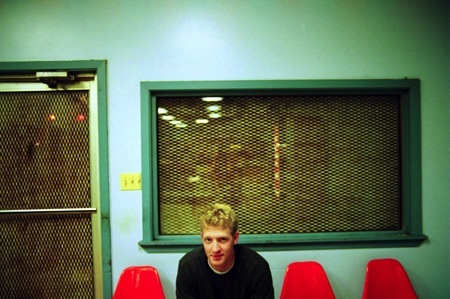
What have you been doing since graduating from LSU?
After graduation I spent six months as a freelance writer in Baton Rouge, hanging out with friends and trying to make it to New York City. In that time I wrote and directed a film called The Country Line. Then after sending out dozens of resumes I got an internship at New York magazine, eventually becoming an editorial assistant and a contributing writer. As exciting as that was, I was still very low on the New York totem pole and not making enough money to stay in Manhattan. On the advice of Cinema Club founder Mark Landry, I enrolled in the Summer Production Workshop at USC in 2004. I went out to L.A. with my friend, Weezie Melancon, who has just directed her first major motion picture called 40 Love. Anyway, it was a great experience studying screenwriting and the mechanics of the film industry from the best film school in the country. Weezie and I had a blast and spending time with Mark felt like we were back at LSU. After that summer I returned home to get married to my amazing wife Courtney and to be a writer and photographer for Baton Rouge Business Report. Business Report’s parent company launched 225 in September 2005. I’m very proud of that magazine.
What's it like writing for 225?
It’s a little like jumping onto a freight train and doing your best to hold on. We have a small staff of dedicated and creative people who are asked to do a lot of things at once. But writing about so many different things happening in Baton Rouge keeps it exciting. And it keeps me plugged into what is going on from arts and culture to politics and business.
What's been your favorite story for 225?
Last year I profiled Arthur Reed (aka Silky Slim), a former gang founder, rapper and convict. Reed has completely turned his life around and now campaigns as an anti-violence activist. He has a non-profit called Stop The Killing Inc., is producing his own documentary and hosts a weekly radio show where he talks honestly about violence in the city. I guess with both the magazine and my film projects, I tend to gravitate towards stories that are about life changes or about people who go great lengths to enact positive change on their environment.
Tell us about your filmmaking projects. You made some while you were an LSU student, right?
I never gave too much thought to the type of films I was making at LSU, except for my desire to do something new and different each time. The first few were just gag-related comedies I made with my roommate Brian Green: Makes 5 Gallons and Drive-Thru Bandits, which was essentially a series of Jackass-style pranks on fast-food chains before Jackass existed. Then they got more interesting with a still-camera B&W piece called Luv and a roommate comedy called Thermostat that starred Grant Widmer of The Eames Era. All of my college films were just excuses to have some fun and do something constructive with my friends.
And you won the Golden Outhouse award. What was that like?
Yes, that was for The Country Line, my first real stab at an extended narrative story. Barrett Black played an aimless college student that has to find his way in life and struggles with his preconceived notions of adulthood and conformity. There was more than a little Holden Caulfield in his character. It felt great to be honored in that way, because there were some great films that year. I’m just glad people got something out of it.
Your film or video projects since then?
Since then, I’ve done several music videos for The Eames Era and Harlan, two of the best Baton Rouge bands in a long time, if you ask me, and very close friends. Last summer I had a video portraits series called Twelve Apostles screen at Art Melt. Inspired by Warhol’s screen tests, I designed Twelve Apostles specifically for an event like Art Melt—more of an installation for display than a narrative piece. My friend Casey McAllister composed some moody music for it, and I was able to convince several young artists and activists in Baton Rouge to sit for the film. Some recognizable faces are Erin Rolfs, an old Reveille friend who went on to be director of Culture Candy, John Norris of Harlan who also is an accomplished painter, and anti-violence activist Arthur Reed.
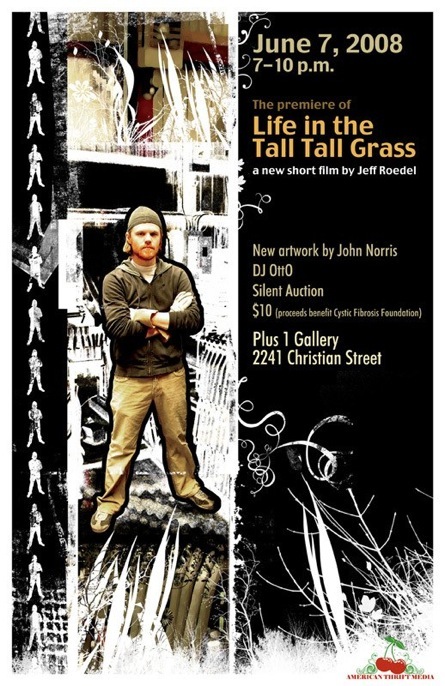
Tell us about Life in the Tall Grass.
That is a 20-minute short film we’re going to premiere on June 7 at PlusOne Gallery on Christian Street, with a party from 7-10 p.m. All proceeds benefit the local chapter of the Cystic Fibrosis Foundation, and we’ll have DJ OttO, a silent auction and food and drinks. It is open to the public and it’s going to be great.
The film itself I shot in November and December 2007 and cut in March 2008. It is set in a depressed Southern town, and stars Brady Crane as a young man trapped by his numbing factory job, trapped by the love he lost, trapped by the new dream that won’t let him sleep. He gets inspired to write and direct an original movie, so he rallies his friends in an attempt to create for the first time a piece of art out of his inartistic landscape. He hopes this endeavor will propel him to a more meaningful existence, or even help him and those around him to escape.
We shot it in the parts of Baton Rouge most people don’t even like to drive through. Lots of broken glass, rust, trash and weeds. I wanted to examine the decay of the tangible. Everything we can see is breaking down: buildings, economic and political systems, our own bodies. The most amazing architecture in the world is falling apart and has to be preserved. Da Vinci’s The Last Supper is fading on the wall. In his second letter to the Corinthians, Apostle Paul writes “So we fix our eyes not on what is seen, but on what is unseen. For what is seen is temporary, but what is unseen is eternal.” I guess I wanted this film to address that truth in some small way. Beyond that the film looks at the psyche of small town America, and the effect that a person leaving home has on those who are left behind.
Where else can we see your work?
You can get updates on my projects and see videos at American Thrift Media. I started American Thrift Media LLC last year as an umbrella company for a host of projects, including short films, music and charity events. Lots of fun stuff is coming soon.
How did you first get involved in cinema? What was the attraction?
I think I was making movies of action figures with Kyle Crane and his little brothers when I was about nine. I guess we’ve all progressed a little bit since then, but hopefully our work still has that energy and excitement you don’t have to fake when you’re a child. The attraction for me was always seeing this avenue for telling a story. If I’d been born in 1880 I would have written novels or maybe plays. But I was born in 1980, so I make movies.
What films are on your desert island list?
For variety I would have to have Dead Poets Society, Rushmore, Hoosiers, The Empire Strikes Back, Almost Famous, and A Hard Day’s Night. Maybe Cast Away, too. Not so much because it’s a great movie, but maybe it would keep my hopes up.
Favorite director(s); actor(s)? Why?
I’m a big fan of David Gordon Green, especially George Washington and All The Real Girls.
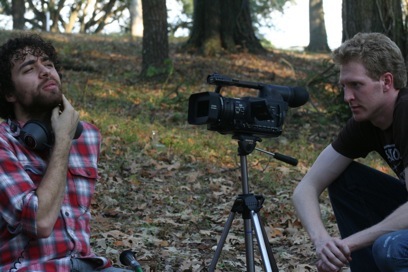
Those movies really opened my eyes to what kind of beautiful stories with depth an indie filmmaker can tell. I haven’t seen it yet, because it was in limited release, but I’m looking forward to his latest Snow Angels. The trailer looks amazing. I also love Wes Anderson’s early films. That guy gets more ideas on screen—using visuals, dialogue, design and music—than just about anyone working right now. Michel Gondry and Charlie Kaufman are unique talents, probably bordering on genius. I’d like to live inside their brains for a day. Martin Scorsese is also a hero of mine. I love his genre-hopping. His work with musicians (The Last Waltz, No Direction Home, Shine A Light) is really inspirational for some of the things I try to do on a much smaller scale.
Any fond memories of LSU?
Oh, sure. Coming from a small private high school, LSU was like a carnival for me. Helping Mark and Kyle get the Cinema Club and Outhouse off the ground was a lot of fun. Those guys are lifelong friends. And even if no one likes your movies or art but you come out of the creative process with strong friendships, then in my book, you still come out ahead.
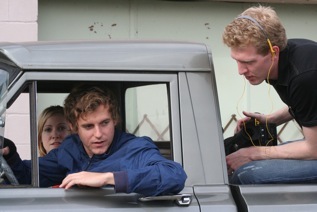
You've stayed in Baton Rouge--what do you think of the opportunities for folks who want to make movies or work in the media industries here, especially those just starting out?
I came back to Baton Rouge and made journalism my career. I never pursued a career in film, but have kept it as a sort of aggressive hobby, I guess. I don’t ever see myself directing studio films, but I would like to be a screenwriter, and feed the beast that way. For those that do want to be full-time in the industry I think the opportunities are much greater now. It’s a fantastic time for people who want to be actors or crew in Hollywood, because you don’t have to go to California to do it. You can make a great living in Louisiana because Hollywood comes here. Nathan Borck, who was in the Cinema Club with us, was having coffee with me the other day and we were discussing this. He’s doing extremely well as an electrician on films, and he does some lighting and camera operating. Grant Widmer, who I mentioned earlier, works in the props department on big budget movies in New Orleans. He loves the freedom of going from project to project. They work long hours in fits and spurts, but those guys get paid well for their time. My friend Britt King is a film editor now with River Road Creative. They mostly do credit sequences and trailers for things Babel and K-Ville. It’s a really great company run by Richie Adams. So those opportunities are there. For people who want to make their own independent films, like I have done, you certainly don’t have to be in Los Angeles for that.
Do you see Baton Rouge becoming the "Hollywood of the south?" Or something else?
That all depends on what people are expecting from that name tag. I think a lot of people who call it that have never been to the actual Hollywood. Saddled between Shreveport and New Orleans, I don’t see Baton Rouge getting more big budget films than those cities in the near future, but there is certainly a lot going for Baton Rouge, and the local film commission led by Amy Mitchell-Smith is working hard to make some great things happen here. Amy worked for years at Miramax and she knows how to get producers interested in the city as a location.
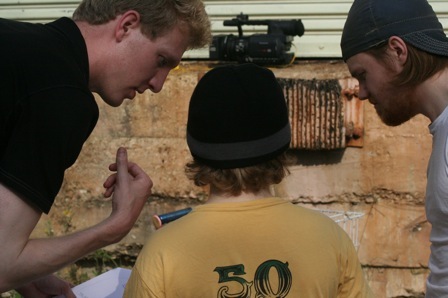
Any advice for our current students?
For young writers and directors, I would say spend your time developing stories you really believe in, stories you think will be engaging to whatever audience you want to entertain. Then get out there and make at least one film by yourself or with just a few friends. Don’t shoot a sequel to The Fifth Element. Think honest and practical and go for realism. Take your time and put everything you have into that project, then go from there. It’s also important to have realistic expectations. The chances of going through film school or working your way up through the system and getting to the point of an auteur like Wes Anderson or Steven Soderbergh where you are able to see your vision for a movie go from the page to movie theaters across the world is extremely rare. So like millions of kids grow up wanting to be a starter in the NBA, only a tiny percentage make it. But that doesn’t mean you can’t get a less glamorous job with the league or organize pick-up games or a charity tournament in your hometown. It’s comforting to know that even if you’re not a professional, you can shoot hoops in your driveway every day. There is security and a lot of freedom in that. You don’t have to be Steven Spielberg to make movies. He’d be the first to tell you that. He made lots of them when he was “nobody” and so can you.